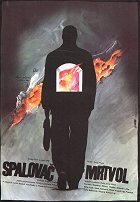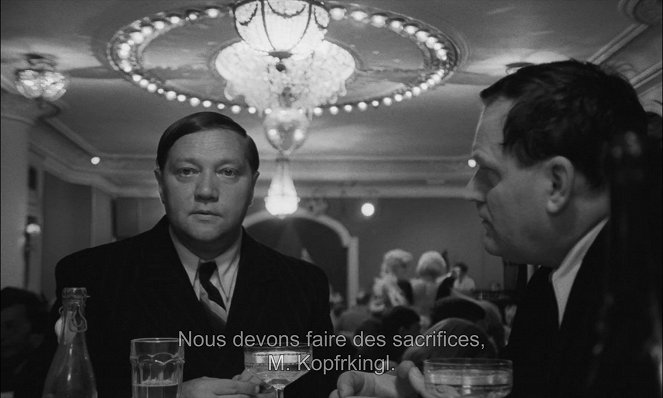Director:
Juraj HerzCámara:
Stanislav MilotaMúsica:
Zdeněk LiškaReparto:
Rudolf Hrušínský, Vlasta Chramostová, Jana Stehnová-Čechová, Miloš Vognič, Ilja Prachař, Zora Božinová, Eduard Kohout, Jiří Lír, Dimitrij Rafalský (más)Sinopsis(1)
El señor Karel domina a sus familiares, amigos y empleados. Sólo está preocupado porque el transito de los difuntos hacia el más allá sea lo más limpio y rápido posible, todo mediante la incineración de cadáveres en el cementerio que regenta. (Filmin)
Reseñas (7)
What more can I say? This film is big! Thanks to Rudolf Hrušínský, great thanks to Ladislav Fuks' book, which Herz was able to translate into an equally suggestive image in an absolutely incredible way. The overall stylization and the very sleek, regular pace of storytelling accurately mirror Roman Kopfrkingl's heart, where everything unfolds in concentric circles, where the same sentences and the same thoughts are repeated over and over again, and where a morbid obsession gradually emerges. First death, then your own specialness. The inner life of a man whose whole world is built on a game, to deny reality and transform it into something bizarrely humble, kind, and sleek, including death. Hrušínský as a half-empty vessel, gradually filled with the poison of ideology and conviction of his own importance, is inhumanly convincing. So is Herz's entire film... The most suggestive portrait of the madness of man and time period that I know.
()
A blissful, heavenly movie, even. The hypnotically dreamy atmosphere goes hand in hand with the innovative technical angle. A blessed thing, so to speak, of human dimensions, without a rival in the whole of our enchantingly beautiful country. And you will find many better movies even in the beautiful outside world. And Rudolf Hrušínský? A blessed actor who no longer has to feel that he didn’t do enough for us.
()
I don't remember when I was so cold during a film the entire time, without anything scary or disturbing happening. Just Hrušínský's presence left me frightened whenever he appeared in a shot. The highlight is the scene of the funeral speech in the closing, where his masterful acting is brought to perfection. Top-notch filmmaking quality, watching it again would require a little bit of courage.
()
One of the ten most significant Czech films of all time, the best direction by Herz and the strongest acting performance by Rudolf Hrušínský on the big screen. Gradually, subtly dosed transformation from a model small-town man to a collaborator and fascist is also a reminder of a series of Czech fates during the authoritarian Second Republic and the occupation (Moravec), as well as a prototype of the transformation of attitudes of our elites during the normalization period. It's no wonder that this film didn't have an easy time... Excellent attention to detail, camera work and especially editing. The morbid atmosphere is understandably not for everyone, but it's great filmmaking at every turn. Overall impression 100%.
()
The delightfully animated performance of the masturbating Rudolf Hrušínský, who jerks and caresses with every gesture and phrase, and practically never leaves the screen during the entire film, is the main asset and the driving force behind the feeling of happiness and success from the audience's contact with Herz's cult. We’ve been reminded many times that Fuks's book was at the beginning and that Fuks was an extremely imaginative author of black humor in his other works. Formally, the film was then grasped by cinematographer Milota and by overusing the fisheye, he foreshadowed immortality, namely that The Cremator will never be forgotten in the film departments of all the better schools. The message is clear: human pettiness is the ruin of the world and we are animals if we prefer to give eternal peace to all the magical things we have around us. However, if we leave aside the minor niceties and the very entertaining film time cutting, in which we are accompanied by the permanently excited Kopfrkingl, we find ourselves very easily in the transparent world of Munich and narrative clichés of Czechoslovak cinema. The time when the celebration of March 15, 1939, culminated has been depicted many times and will be many more times. Yet here I find a certain shift of the kindly father away from the family, who so enjoys coming to the house full of shouting and, while he chooses a wife very similar to the one at home, he discusses with his new fellow townsmen the events to come. I also regret to point out that apart from Hrušínský's extraordinary performance, the other cast of roles is too typecast and pigeonholed. It is also trivial that with such a clearly defined time and destination, we find ourselves once again in a tangle of Krumbachian timelessness, full of bold eyeliner and crazy artificial wig creations. Chramostová's obedient wife is not unlike the one she played with similar humility in another film, and Menzel's nervous character is just another variation on his constant role in front of the camera, not to mention the typecasting of the young Kraus, the almost pubescent Vízner, the scattered Rosůlková or God forbid Gollová in the position of her second sovereign career. The lyrical Šulcová is also the same as always, while the comic duo of the hysterical Myslíková-Menšík marriage seems to have fallen out of a second-rate TV production, and we can take secondary pleasure only in the unscrupulous Prachař - although this was nothing new for him either - and the spicy Kohout, who has been a favorite since forever. The final memorable faces are the extraordinary Štekl and the absurd Anýžová. So what is the point of all this? Blood and ashes are one.
()
Together with Markéta Lazarova, this is probably the greatest treasure ever to come out of Czechoslovak cinema. The masterful direction dictates a very evocative and incredibly depressing atmosphere, which is further deepened by Liška's brilliant, almost ethereal (as usual) music and the now famous "fisheye" camera, whose contribution to the final artistic and emotional impact of the film is incalculable. The rest is taken care of by the slick and endlessly garrulous Rudolf Hrušínský, who portrays his book character so believably that even Fuks himself had to shudder at his performance. A shocking, cinematically timeless and thought-provoking work that leaves the patient viewer with so many feelings, impressions and attitudes that repeated viewings are mandatory. One of the few times I put a film adaptation above the level of the book. 95%
()
"The Cremator" is an incredible movie, really. But there wasn't much doubt about that. Its history has already been thoroughly reviewed. The way Juraj Herz uses the camera, capturing various details, and the constant echo of Hrušínský's voice, these are just the basics of the creeping horror that sneaks into your heart. An immensely professional and complex work that truly has no equal in Czech and Slovak history.
()

